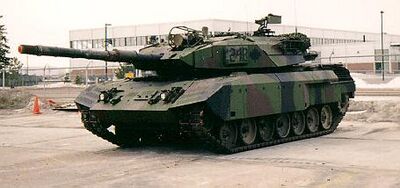Strv 104: Difference between revisions
No edit summary |
No edit summary |
||
| (3 intermediate revisions by the same user not shown) | |||
| Line 4: | Line 4: | ||
| image_size = 400px | | image_size = 400px | ||
| alt = | | alt = | ||
| caption = Acrean Strv | | caption = Acrean Strv 104C in 1978 | ||
| type = Main Battle Tank | | type = Main Battle Tank | ||
| origin = {{flag|Acrea}} | | origin = {{flag|Acrea}} | ||
| Line 94: | Line 94: | ||
}} | }} | ||
The '''Stridsvagn 104 Lynx''' is a main battle tank developed by Landrut ASA in the 1950s for the [[Acrean Armed Forces]]. It is a further development of the [[Strv 102]] which entered service in 1950. | The '''Stridsvagn 104 Lynx''' is a main battle tank developed by Landrut ASA in the 1950s for the [[Acrean Armed Forces]]. It is a further development of the [[Strv 102]] which entered service in 1950. | ||
The design of the Strv 104 was fundamentally similar to the earlier Strv 102, though with improvements in practically all areas. It featured a newer, improved 105mm main gun capable of firing higher pressure ammunition than the Strv 102's | The design of the Strv 104 was fundamentally similar to the earlier Strv 102, though with improvements in practically all areas. It featured a newer, improved 105mm main gun capable of firing higher pressure ammunition than the Strv 102's M49 cannon. This was paired with a coincidence rangefinder and an improved stabilisation system. The engine was slightly uprated in all variants to improve tactical mobility. The armour initially saw modest improvements until the introduction of the Strv 104A1 variant in 1964, which utilised new composite armour in a redesigned turret and slightly enlarged hull which provided a substantial boost to protection. These improvements created a well armed, well protected tank with exceptional battlefield mobility for the period. | ||
==Design== | ==Design== | ||
Latest revision as of 17:17, 4 February 2023
| Stridsvagn 104 Lynx | |
|---|---|
 Acrean Strv 104C in 1978 | |
| Type | Main Battle Tank |
| Place of origin | |
| Service history | |
| In service | 1960-Present |
| Used by | |
| Production history | |
| Designer | Landrut ASA Maybach AG Kobalt-Zeiss GmbH & Co KG Thyssen AB |
| Designed | 1955-1960 |
| Manufacturer | Landrut Landsystemet GmbH |
| Produced | 1960-Present |
| No. built | approx. 15,000 |
| Specifications | |
| Weight | 44 tonnes |
| Crew | 4 |
| Armor | Steel Composite (Acrean models from 1964 onwards) |
Main armament | KvK M58 105mm smoothbore tank gun |
Secondary armament | Coaxial 7.62mm MG 59 Various Top-Mounted 7.62mm and 13mm guns |
| Engine | Thyssen-Maybach MTU K0-60 V12 Turbocharged Diesel |
Operational range | 500 km |
| Speed | 75 km/h (Road) ~50 km/h (Cross-Country) |
The Stridsvagn 104 Lynx is a main battle tank developed by Landrut ASA in the 1950s for the Acrean Armed Forces. It is a further development of the Strv 102 which entered service in 1950.
The design of the Strv 104 was fundamentally similar to the earlier Strv 102, though with improvements in practically all areas. It featured a newer, improved 105mm main gun capable of firing higher pressure ammunition than the Strv 102's M49 cannon. This was paired with a coincidence rangefinder and an improved stabilisation system. The engine was slightly uprated in all variants to improve tactical mobility. The armour initially saw modest improvements until the introduction of the Strv 104A1 variant in 1964, which utilised new composite armour in a redesigned turret and slightly enlarged hull which provided a substantial boost to protection. These improvements created a well armed, well protected tank with exceptional battlefield mobility for the period.